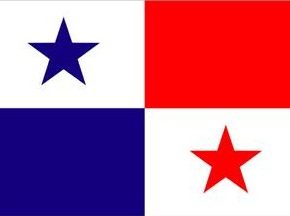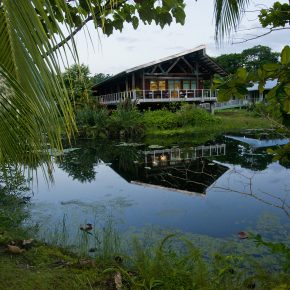 Tropical Marine Biology/Panama
Tropical Marine Biology/Panama
Study Marine Biology in Panama at the Smithsonian Tropical Research Institute
September 5-19, 2024
Contact for Questions
OIMB is excited to offer a course that will focus on the biology of tropical coastal habitats (coral reefs, mangroves, seagrass meadows) and relevant anthropogenic issues on both local and global scales. The course will be offered at the Bocas Research Station (BRS), a facility operated by the Smithsonian Tropical Research Institute (STRI). BRS is located on Isla Colon, a part of an archipelago located along the Caribbean coast of Panama.
Course Details
The Tropical Marine Biology-Panama program is a seven-credit course in Biology with 400-level credit. The program consists of a one-credit course in spring (BI405) and a two-part summer term course (one-credit, 8 week planning the research project and five-credit, two weeks of on-site academic instruction and fieldwork in Panama). OIMB Faculty Richard Emlet and Maya Watts are the instructors for the program.
BI405 Reading (1 credit P/NP) During spring term, students explore primary and secondary literature on the habitats and environmental issues that will be seen in Panama. Students make presentations on their readings and participate in weekly discussions. Students will be required to develop a bibliography of material useful for their subsequent experience in Panama. Residency at OIMB is not required to participate. Evaluation will be based on completion of the assignments and participation in the discussion. Class meets for one hour each week and will involve video conferencing for students on main campus.
OXLA 488/588 Tropical Marine Biology in Panama (6 credits)
Summer term preceding the September field course
During the summer preceding the Panama field course, students will work to design and plan their research project to carry out during the field course in Panama. This pre-departure effort will involve periodic submissions of (and feedback on) planning reports organized around i) project design (questions and hypotheses) and background literature, ii) project experiments, methodology and expected data, and iii) a completed project proposal with a list of materials necessary to conduct the research. This component is included in the study abroad program course fee. Students do not enroll for it separately. Residency at OIMB is not required.
September Field Course in Panama
The course in Panama will be a combination of a large number of field trips to a variety of tropical habitats (coral fringing and patch reefs, mangroves, and sea grass meadows), a planned research project with field observations, data collection and analysis, and lectures on habitats and organisms. Students will keep a daily journal of their observations and experiences and will conduct a research project lasting several days over a week long period. Assessment of student work will focus on completion and quality of journal entries and presentation of research results in the form of an oral presentation and a research poster.
*Students cannot sign up for BI488 through Duckweb, but instead are assigned grades and credits (6) as part of the GEO study-abroad course.
2024 Field Course Dates: September 5th-19th.
Eligibility
Students must be majors in Marine Biology, Biology or Environmental Science, who by the time they leave for Panama have successfully completed at least one term at OIMB, including the BI 451 Invertebrate Zoology course offered in both spring and summer terms.
How to Apply
Applications must be made at the GEO website.
The priority deadline, which includes a discounted program fee, is due February 15, 2024 and the final deadline is April 15, 2024. Students will be notified of acceptance no later than April 25, 2024.
Program Costs
The program fee (coming soon) includes all UO tuition, housing and meals while in Panama. A detailed budget is available at the GEO webpage and describes the expenses not included in the GEO program fee such as International airfare from the US to Panama and personal expenses. The Panama course has funding from the Williams Council for a limited amount of financial aid for students who qualify. Priorities will be given to students who are Pell Grant eligible and part of the Pathway Oregon program, but any student who qualities for financial aid may also apply for funds to partially offset the cost of this study-abroad course. The GEO webpage also has information on scholarships. Students should start applying for the GEO or other scholarships soon because most scholarships have earlier deadlines. Students also have the option of using financial aid funds to pay for this program. Consult your financial aid advisor for details.
Program Logistics
Students will stay in the dorms on the Bocas Research Station campus. Meals will be provided. The station has a 24 hour security system. Course activities will include snorkeling, but not SCUBA. All internal travel is covered by program cost.
